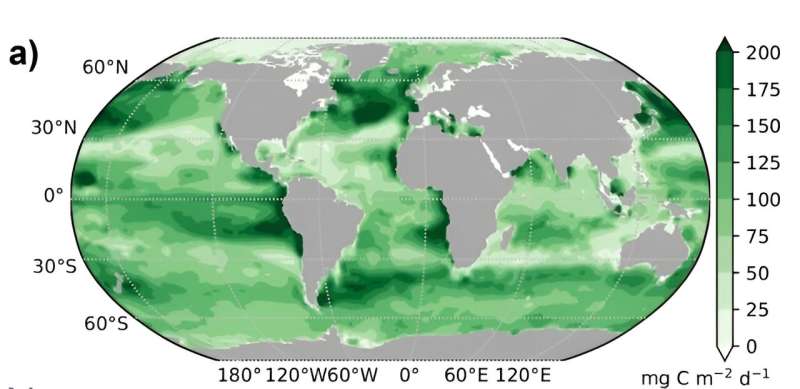This article has been reviewed according to Science X's editorial process and policies. Editors have highlighted the following attributes while ensuring the content's credibility:
fact-checked
peer-reviewed publication
trusted source
proofread
The ocean may be storing more carbon than estimated in earlier studies

The ocean's capacity to store atmospheric carbon dioxide is some 20% greater than the estimates contained in the latest IPCC report. These are the findings of a study published in the journal Nature led by an international team including a biologist from the CNRS. The scientists looked at the role played by plankton in the natural transport of carbon from surface waters down to the seabed.
Plankton gobble up carbon dioxide and, as they grow, convert it into organic tissue via photosynthesis. When they die, part of the plankton is transformed into particles known as 'marine snow'. Being denser than seawater, these particles sink down to the seabed thus storing carbon there and providing essential nutrients for a wide range of deep-sea organisms, from tiny bacteria to deep-sea fish.
By analyzing a bank of data collected from around the world by oceanographic vessels since the 1970s, the team of seven scientists was able to digitally map fluxes of organic matter throughout the world's oceans. The resulting new estimate of carbon storage capacity is 15 metric gigatonnes per year, an increase of around 20% compared with previous studies (11 metric gigatonnes per year) published by the IPCC in its 2021 report.
This reassessment of the ocean's storage capacity represents a significant advance in our understanding of carbon exchanges between the atmosphere and the ocean at the global level.
While the team stresses that this absorption process takes place over tens of thousands of years, and is therefore not sufficient to offset the exponential increase in CO2 emissions caused by worldwide industrial activity since 1750, the study nonetheless highlights the importance of the ocean ecosystem as a major player in the long-term regulation of the global climate.
More information: Wei-Lei Wang, Biological carbon pump estimate based on multidecadal hydrographic data, Nature (2023). DOI: 10.1038/s41586-023-06772-4. www.nature.com/articles/s41586-023-06772-4
Journal information: Nature
Provided by CNRS




















